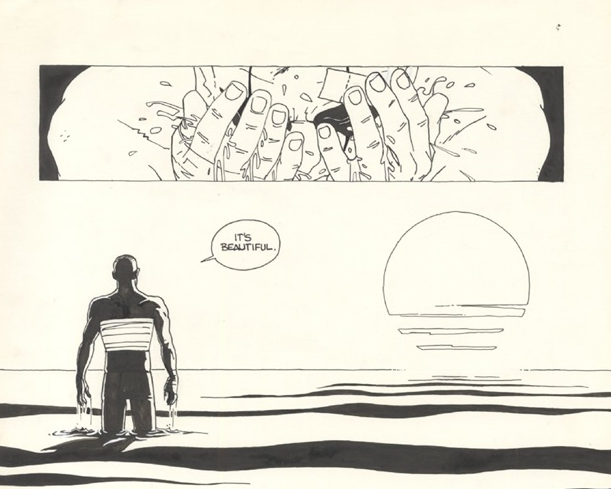 Paris
Paris
Written by Andi Watson
Art by Simon Gane
Published by Image Comics Sometimes you find a comic that makes you feel like you've been transported to another place and time. That's a special and rare feeling, and it's the feeling I get when I read Paris, the graphic novel from writer Andi Watson and artist Simon Gane. It's my favorite thing I've read so far this year, and I'm sure it will show up on my list of year-end favorites. The story is beautiful, romantic, smart, and compelling, and the art is really just sublime. I wish I could literally step into the world depicted in the pages of Paris.
Paris is set in the early-to-mid 1950's, and centers around two main characters. There's Juliet, an American who's here in Paris to study art in the traditional way, so that she can "learn the rules before she breaks them". But Juliet is chafing under the strictures of her school and teacher. She's got modern ideas, and doesn't want to be constrained in how to become the artist that she should be. She doesn't have much money, and she's paying her tuition (in part) by (unhappily) painting portraits of wealthy young women in Paris. Speaking of those young women, the other main character in the story is Deborah. She's an young English woman spending time in Paris under the watchful eye of her controlling, crusty old chaperone, Aunt Chapman. Deborah feels frustrated because she's in the most beautiful city in the world, but she feels lonely and also not free to explore. But then Juliet and Deborah meet each other, and everything changes. I don't want to say much more about the plot, because it's sweet, romantic, and lovely, and worth exploring and discovering for yourself.

I absolutely adored this comic.
Paris is a beautiful story about which I'll speak more, but what I want to say to you is that even if this story didn't have any dialogue, you could still understand the story very well. I'd still love it and want to luxuriate in the art. Gane's work in this story is just staggering to me. I first saw Gane’s work a number of years ago in the terrific Image Comics series
They're Not Like Us, written by Eric Stephenson. I observed there that "Gane’s art has a naturalistic, "analog" feel. Gane's style feels very much his own, but his detailed, emotive, scratchy lines remind me in a general way of artists such as Paul Pope, Paul Maybury, Rafael Grampa and James Stokoe (so, some very good company)". But as much as I enjoyed Gane's art in
They're Not Like Us, there’s nothing that would prepare me for how much I really fall in love with his art within the pages of Paris.
Part of what makes Gane's work in
Paris so effective is the hyper-specific level of detail on every single page of the story. From the first page of the comic (even before the actual story begins), it's easy to see the amount of time that Gane has put into every single panel and page of the story. Every brick, every column, every street sign, every leaf on every tree - they're all rendered with a loving level of detail. Gane's style is not a hyper-realistic style of art; the characters are exaggerated for comic effect, and are drawn in highly stylized ways. But Paris itself, which is the title of the book and every much a central character in the story, is truly brought to life in painstaking detail in a way that makes the city seem entirely real, in a very organic, naturalistic sense. This is not a precise rendering. In some ways the city feels
more real than real; it’s the Paris of dreams and memory and eternal love and romance.
I also want to say that just because Gane’s characters are not “realistic” in the narrow sense of “characters looking like and proportioned like actual people walking down the street”, doesn’t mean that those characters themselves are not also as true and real as the city. They are. Gane’s line work renders Juliet and Deborah with great detail and care. We can see the beauty of each of the characters, and we understand why each is drawn to the other. And while some of the other characters are more broadly drawn as archetypes (like Aunt Chapman), we still see all of them as people and not as cartoon characters.
Paris is, among other things, a story about people reckoning with emotions and maybe finding love in an unlikely situation. It's also a story about two women both trying to break out of the roles that society wants to place them in. In this, the parallel between Juliet and Deborah is really interestingly done. Juliet's family is a working to middle-class family, and for her to pursue her dream of becoming an artist, she's having to hustle and work extra hard. It would be very easy for her to fall back into just being with her family and fulfilling whatever expectations they have for her. Juliet is living her dream of becoming an artist, but it's clearly pretty precarious, and feels like something that could easily be taken away from her. Deborah, by contrast, is clearly from tremendous wealth. But her life seems far more constrained than that of Juliet. Wealth and privilege notwithstanding, Deborah isn't free to go where she chooses. She's got a close eye on her at virtually all times, making sure she doesn't make any decisions that would be inappropriate for someone of her station. In fact, later on in the story, an incredibly significant life decision is just basically made for Deborah, without any input from her.
But when Deborah and Juliet meet, it unlocks something for both of them. For Juliet, the assignment of painting Deborah causes Juliet to be inspired by painting once again. She's been feeling disillusioned by her painting studies, as they don't seem to make her feel passion or joy. And engaging with Deborah gives her all of that. For Deborah, spending time with Juliet enables her to find her self as someone with the soul of an artist, and to realize who she is and what she wants. Spending time with this more free spirit inspires Deborah's sense of freedom as well. It's a compelling story where I certainly came to care very much about the main characters, and to root for them.
Paris, much like the city itself, it’s just a really special, unique book. I absolutely adore this story, and it since place, and romance, and longing, and the creative spirit. I think you’ll love it too.









